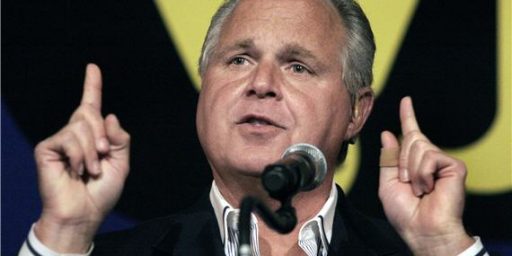On the Conservative Movement
I think that Daniel Larison is dead on right when it comes to describing a disturbingly large portion of the conservative base in this post.
Conservatives seem to have spent the last year rapidly regressing from cheering on lame politicians who could at least intelligently recite their platitudes (Romney) to worshipping pseudo-populists who could not even do that (Palin) to elevating random guys who didn’t like taxes (the Plumber) to rallying around a radio host who makes Romney’s own brand of Reagan nostalgia and three-legs-of-the-stoolism seem deep and meaningful by comparison. Of course, there isn’t that much substantively different between Romney’s opportunistic recitations and Limbaugh’s boilerplate, but at least with Romney you knew that he was capable of saying something else and would have said it if he had thought it was to his advantage. The boilerplate is not only all Limbaugh knows how to say, but if you pressed him to elaborate on any of it he would just repeat himself.
This is, sadly, quite right. I read most of the major conservative blogs and magazines and am frankly distressed at the tone the movement has taken over the past several years. There are very few people out there pushing real, conservative/libertarian opinions out there in a fresh way that recognizes that the policy challenges and solutions are not the same as the were in 1929/1960/1980/1993. Instead, even from self-proclaimed conservative intellectuals like Newt Gingrich, all we get are tired ideas that have no bearing on the economic and policy problems of today. How the hell is repealing the estate tax going to solve the collapse of the financial system? How can we drill for more oil now when oil companies are currently divesting from new drilling because of the sharp decline in the price of oil? How can cutting earmarks be the key to getting to a balanced budget when they comprise only a tiny portion of the deficit? Yes, we should “replace Sarbanes-Oxley,” but what is the suggested alternative?
More to the point, what is the conservative vision for what the economy should look like? All I ever hear is “tax cuts!” and “less regulation!” Right now, conservatives aren’t pushing a clear picture of what they want. Largely because, I suspect, because they’re not sure. Best as I can figure, the answer is “whatever will annoy liberals.” That might make folks like Limbaugh and Coulter rich, but it’s hardly a way forward for the future.
I voted for Obama knowing full well that his economic vision and mine were not the same. But one key thing to realize is that McCain’s was barely any different. Twiddling around with marginal tax rates and differing bailout plans won’t do a thing to alter the fundmental structure of the American economy. And that’s what we need. Frankly, I doubt a McCain Administration stimulus package would look very different than Obama’s. A few more tax cuts here, a little bit different spending there… but overall neither the Republican Party nor the Democratic Party have grasped some of the fundamental changes in the economy that would be possible if the rules weren’t set up to be rigged in favor of large, bureaucratic, economy-dominating, big government dependent corprorations instead of small, nimble, niche-oriented entrepreneurs.
That’s because both parties are too deeply invested in the rules.
Photo by Flickr user skye820, used under Creative Commons license.







This seems to me to make a fatal assumption; that any governmental action in that area is required at all. If you’re going to argue from a libertarian bent, doesn’t it make sense to first ask, in such matters, if it’s an area where government belongs at all?
So you voted for Obama with your fingers crossed believing he would not be the socialist he clearly indicated he would be? I hope you learned your lesson. Stephen Taylor seemed to say the same thing. Bush sucked, McCain wouldn’t really be that much different, so let’s give the new guy a chance. A Chance to do what? Now you know.
Pete,
If you read more carefully, you would see that I don’t think that McCain’s policies would be much different from Obama’s. I voted for Obama because he was a superior candidate in virtually all aspects, but that doesn’t mean I agreed with him on all aspects.
Bit,
Newt’s the one who suggested replacing it. And as long as corporations are quasi-state entities, I agree.
Bithead — Enron, Tyco, Adelphia, Peregrine & WorldCom took a lot of investors for a ride. They cost sensible investors and pension funds dearly by lying to them. They were in bed with their accountants, particularly in the case of Enron & Anderson. Sarbanes-Oxley is an imperfect effort to give investors accurate information. That is a crucial part of a functional capitalist economy. So yes, I think that this is a place where the government damn’d well better belong.
This has been another edition of easy answers to simple questions.
How is that not a vision? How is that not a good hunk of conservative/libertarian philosophy in a nutshell (at least economically): less government?
I jotted a few things down the other day (mostly a collection of links), and it seems that there are plenty of boring details, but you could essentially boil things down to the quote above.
I suppose I could summarize the Obama plan in a similar fashion: “All I ever hear is ‘raise taxes!’ and ‘more regulation!'”. How is that a vision?
Perhaps so. Yet, what has govenment done about it? Did S-O solve these issues, or make them worse?
I’d call multiple trillions of tax dollars a bit of a ride, wouldn’t you?
He makes a large number of suggestions… most fairly good, but many of them aren’t particularly conservative or libertarian, either. I’d suggest the one you point up as a case in point.
Then again, he’s never calimed Libertarian roots. You however did, in this very post. So once again, comes the question; If you’re going to argue from that perspective, shouldn’t the question ‘should govenment be involved with this thing at all’ be question one on any proposal for legislation?
Bit,
My preferred solution to get government out of it is to abolish the publicly traded corporation entirely, or at the very least radically change its form from the quasi-governmental functions it has today.
yes corporations are creations of the state you want the government out of it, dissolve them. I would be all for that …
Alex, I too believed Obama to be a better candidate, in many ways. But, when I asked myself what would be our biggest problem for the next couple of years, Obama’s obvious economic philosophy, I knew, would not provide the best prescription for correction. That was enough for me, though I never liked McCain or his political legacy, to pull the lever for McCain. He is not as dogmatic as Obama in his economic philosophy.
The problem is that “less government” is not really a description of anything. The same goes for “cut taxes” and “less regulation”. Unless you can tell people specifically where and by how much, it’s just platitudes.
What in the world would John McCain’s stimulus have had in it that would cost 780 odd billion dollars? Certainly there would have been no $38B unemployment increase, no $87B payoff to state Medicaid programs, no $40B to subsidize health care insurance for poor people, no $20B for medical IT systems, no provision to undo Clinton Welfare Reform, and no $125B for public education.
Unless you mean “the Democratic Congress would never have passed a substantially different stimulus” in which case I agree with you.
JohnG, quite simple: McCain would have added another couple hundred billion in tax cuts for the wealthy.
I didn’t read this thread until I had time to read it all. I think this is true but I haven’t seen anyone else say it:
Though I can give JohnG an ironic answer to this question:
Think “Iran”
How about this?
How about 25% for the top corporate tax rate? link, link
There are lots and lots of variations on the themes: flat tax, fair tax, etc. Regulation issues are similar. There are plenty of particulars out there. Unfortunately, I think too many folks just glaze over at the specifics and cry, “All I ever hear is “tax cuts!†and “less regulation!—
hpb,
Those are very good specific proposals on what taxes to cut. Now how are you going to pay for it?
Moving to the left, back towards the apex of the Laffer curve, would increase tax revenues. But the question is really what to cut.
If neither side will listen, maybe it’s because they are not us! Has anyone stopped to think that America has become a different country with different values based on a slow, but steady inflow from radically different cultures? Soon, 50% of the voters will pay no taxes and get checks back from the government, i.e. you and I. There is no going back and all of the intellectual debate between conservatives and libertarians is now just noise. They, the check receivers, don’t care, as long as they get their check. There is a slow but sure awakening out there of this fact as evidenced by the stock market. The taxpayers are withdrawing their funds and liquidating all that they can. They may not have a place to go yet, but as the world sinks into economic decay, those with money and a good work ethic will be welcome almost anywhere else in the world. It happened before in our history, the Scots-irish emegration en masse from England to N Ireland and then to America 100 years latter. Maybe America’s time is past and it’s time to move on.